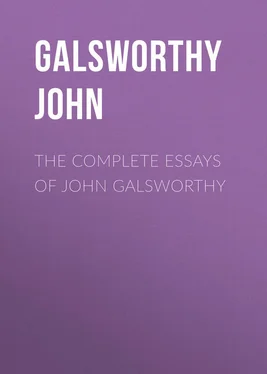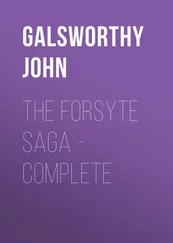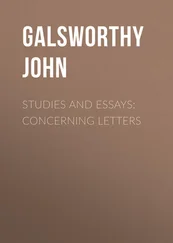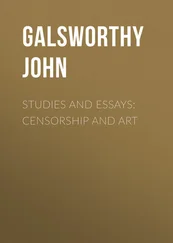John Galsworthy - The Complete Essays of John Galsworthy
Здесь есть возможность читать онлайн «John Galsworthy - The Complete Essays of John Galsworthy» — ознакомительный отрывок электронной книги совершенно бесплатно, а после прочтения отрывка купить полную версию. В некоторых случаях можно слушать аудио, скачать через торрент в формате fb2 и присутствует краткое содержание. Жанр: foreign_antique, foreign_prose, на английском языке. Описание произведения, (предисловие) а так же отзывы посетителей доступны на портале библиотеки ЛибКат.
- Название:The Complete Essays of John Galsworthy
- Автор:
- Жанр:
- Год:неизвестен
- ISBN:нет данных
- Рейтинг книги:5 / 5. Голосов: 1
-
Избранное:Добавить в избранное
- Отзывы:
-
Ваша оценка:
- 100
- 1
- 2
- 3
- 4
- 5
The Complete Essays of John Galsworthy: краткое содержание, описание и аннотация
Предлагаем к чтению аннотацию, описание, краткое содержание или предисловие (зависит от того, что написал сам автор книги «The Complete Essays of John Galsworthy»). Если вы не нашли необходимую информацию о книге — напишите в комментариях, мы постараемся отыскать её.
The Complete Essays of John Galsworthy — читать онлайн ознакомительный отрывок
Ниже представлен текст книги, разбитый по страницам. Система сохранения места последней прочитанной страницы, позволяет с удобством читать онлайн бесплатно книгу «The Complete Essays of John Galsworthy», без необходимости каждый раз заново искать на чём Вы остановились. Поставьте закладку, и сможете в любой момент перейти на страницу, на которой закончили чтение.
Интервал:
Закладка:
“Surely not,” he said at last, “except as ministers of God’s laws.”
“You do not then think that it is Christian for the husband of such a woman to keep her in that state of suffering – not being, of course, a minister of God?”
He began stammering at that: “I – I – ” he said. “No; that is, I think not-not Christian. No, certainly.”
“Then, such a marriage, if persisted in, makes of the wife indeed a Christian, but of the husband – the reverse.”
“The answer to that is clear,” he said quietly: “The husband must abstain.”
“Yes, that is, perhaps, coherently Christian, on your theory: They would then both suffer. But the marriage, of course, has become no marriage. They are no longer one flesh.”
He looked at me, almost impatiently as if to say: Do not compel me to enforce silence on you!
“But, suppose,” I went on, “and this, you know; is the more frequent case, the man refuses to abstain. Would you then say it was more Christian to allow him to become daily less Christian through his unchristian conduct, than to relieve the woman of her suffering at the expense of the spiritual benefit she thence derives? Why, in fact, do you favour one case more than the other?”
“All question of relief,” he replied, “is a matter for Caesar; it cannot concern me.”
There had come into his face a rigidity – as if I might hit it with my questions till my tongue was tired, and it be no more moved than the bench on which we were sitting.
“One more question,” I said, “and I have done. Since the Christian teaching is concerned with the spirit and not forms, and the thread in it which binds all together and makes it coherent, is that of suffering – ”
“Redemption by suffering,” he put in.
“If you will – in one word, self-crucifixion – I must ask you, and don’t take it personally, because of what you told me of yourself: In life generally, one does not accept from people any teaching that is not the result of firsthand experience on their parts. Do you believe that this Christian teaching of yours is valid from the mouths of those who have not themselves suffered – who have not themselves, as it were, been crucified?”
He did not answer for a minute; then he said, with painful slowness: “Christ laid hands on his apostles and sent them forth; and they in turn, and so on, to our day.”
“Do you say, then, that this guarantees that they have themselves suffered, so that in spirit they are identified with their teaching?”
He answered bravely: “No – I do not – I cannot say that in fact it is always so.”
“Is not then their teaching born of forms, and not of the spirit?”
He rose; and with a sort of deep sorrow at my stubbornness said: “We are not permitted to know the way of this; it is so ordained; we must have faith.”
As he stood there, turned from me, with his hat off, and his neck painfully flushed under the sharp outcurve of his dark head, a feeling of pity surged up in me, as if I had taken an unfair advantage.
“Reason – coherence – philosophy,” he said suddenly. “You don’t understand. All that is nothing to me – nothing – nothing!”
1911
WIND IN THE ROCKS
Though dew-dark when we set forth, there was stealing into the frozen air an invisible white host of the wan-winged light – born beyond the mountains, and already, like a drift of doves, harbouring grey-white high up on the snowy skycaves of Monte Cristallo; and within us, tramping over the valley meadows, was the incredible elation of those who set out before the sun has risen; every minute of the precious day before us – we had not lost one!
At the mouth of that enchanted chine, across which for a million years the howdahed rock elephant has marched, but never yet passed from sight, we crossed the stream, and among the trees began our ascent. Very far away the first cowbells chimed; and, over the dark heights, we saw the thin, sinking moon, looking like the white horns of some devotional beast watching and waiting up there for the god of light. That god came slowly, stalking across far over our heads from top to top; then, of a sudden, his flame-white form was seen standing in a gap of the valley walls; the trees flung themselves along the ground before him, and censers of pine gum began swinging in the dark aisles, releasing their perfumed steam. Throughout these happy ravines where no man lives, he shows himself naked and unashamed, the colour of pale honey; on his golden hair such shining as one has not elsewhere seen; his eyes like old wine on fire. And already he had swept his hand across the invisible strings, for there had arisen, the music of uncurling leaves and flitting things.
A legend runs, that, driven from land to land by Christians, Apollo hid himself in Lower Austria, but those who ever they saw him there in the thirteenth century were wrong; it was to these enchanted chines, frequented only by the mountain shepherds, that he certainly came.
And as we were lying on the grass, of the first alp, with the star gentians – those fallen drops of the sky – and the burnt-brown dandelions, and scattered shrubs of alpen-rose round us, we were visited by one of these very shepherds, passing with his flock – the fiercest-looking man who ever, spoke in a gentle voice; six feet high, with an orange cloak, bare knees; burnt as the very dandelions, a beard blacker than black, and eyes more glorious than if sun and night had dived and were lying imprisoned in their depths. He spoke in an unknown tongue, and could certainly not understand any word of ours; but he smelled of the good earth, and only through interminable watches under sun and stars could so great a gentleman have been perfected.
Presently, while we rested outside that Alpine hut which faces the three sphinx-like mountains, there came back, from climbing the smallest and most dangerous of those peaks, one, pale from heat, and trembling with fatigue; a tall man, with long brown hands, and a long, thin, bearded face. And, as he sipped cautiously of red wine and water, he looked at his little conquered mountain. His kindly, screwed-up eyes, his kindly, bearded lips, even his limbs seemed smiling; and not for the world would we have jarred with words that rapt, smiling man, enjoying the sacred hour of him who has just proved himself. In silence we watched, in silence left him smiling, knowing somehow that we should remember him all our days. For there was in his smile the glamour of adventure just for the sake of danger; all that high instinct which takes a man out of his chair to brave what he need not.
Between that hut and the three mountains lies a saddle – astride of all beauty and all colour, master of a titanic chaos of deep clefts, tawny heights, red domes, far snow, and the purple of long shadows; and, standing there, we comprehended a little of what Earth had been through in her time, to have made this playground for most glorious demons. Mother Earth! What travail undergone, what long heroic throes, had brought on her face such majesty!
Hereabout edelweiss was clinging to smoothed-out rubble; but a little higher, even the everlasting plant was lost, there was no more life. And presently we lay down on the mountain side, rather far apart. Up here above trees and pasture the wind had a strange, bare voice, free from all outer influence, sweeping along with a cold, whiffing sound. On the warm stones, in full sunlight, uplifted over all the beauty of Italy, one felt at first only delight in space and wild loveliness, in the unknown valleys, and the strength of the sun. It was so good to be alive; so ineffably good to be living in this most wonderful world, drinking air nectar.
Behind us, from the three mountains, came the frequent thud and scuffle of falling rocks, loosened by rains. The wind, mist, and winter snow had ground the powdery stones on which we lay to a pleasant bed, but once on a time they, too, had clung up there. And very slowly, one could not say how or when, the sense of joy began changing to a sense of fear. The awful impersonality of those great rock-creatures, the terrible impartiality of that cold, clinging wind which swept by, never an inch lifted above ground! Not one tiny soul, the size of a midge or rock flower, lived here. Not one little “I” breathed here, and loved!
Читать дальшеИнтервал:
Закладка:
Похожие книги на «The Complete Essays of John Galsworthy»
Представляем Вашему вниманию похожие книги на «The Complete Essays of John Galsworthy» списком для выбора. Мы отобрали схожую по названию и смыслу литературу в надежде предоставить читателям больше вариантов отыскать новые, интересные, ещё непрочитанные произведения.
Обсуждение, отзывы о книге «The Complete Essays of John Galsworthy» и просто собственные мнения читателей. Оставьте ваши комментарии, напишите, что Вы думаете о произведении, его смысле или главных героях. Укажите что конкретно понравилось, а что нет, и почему Вы так считаете.












